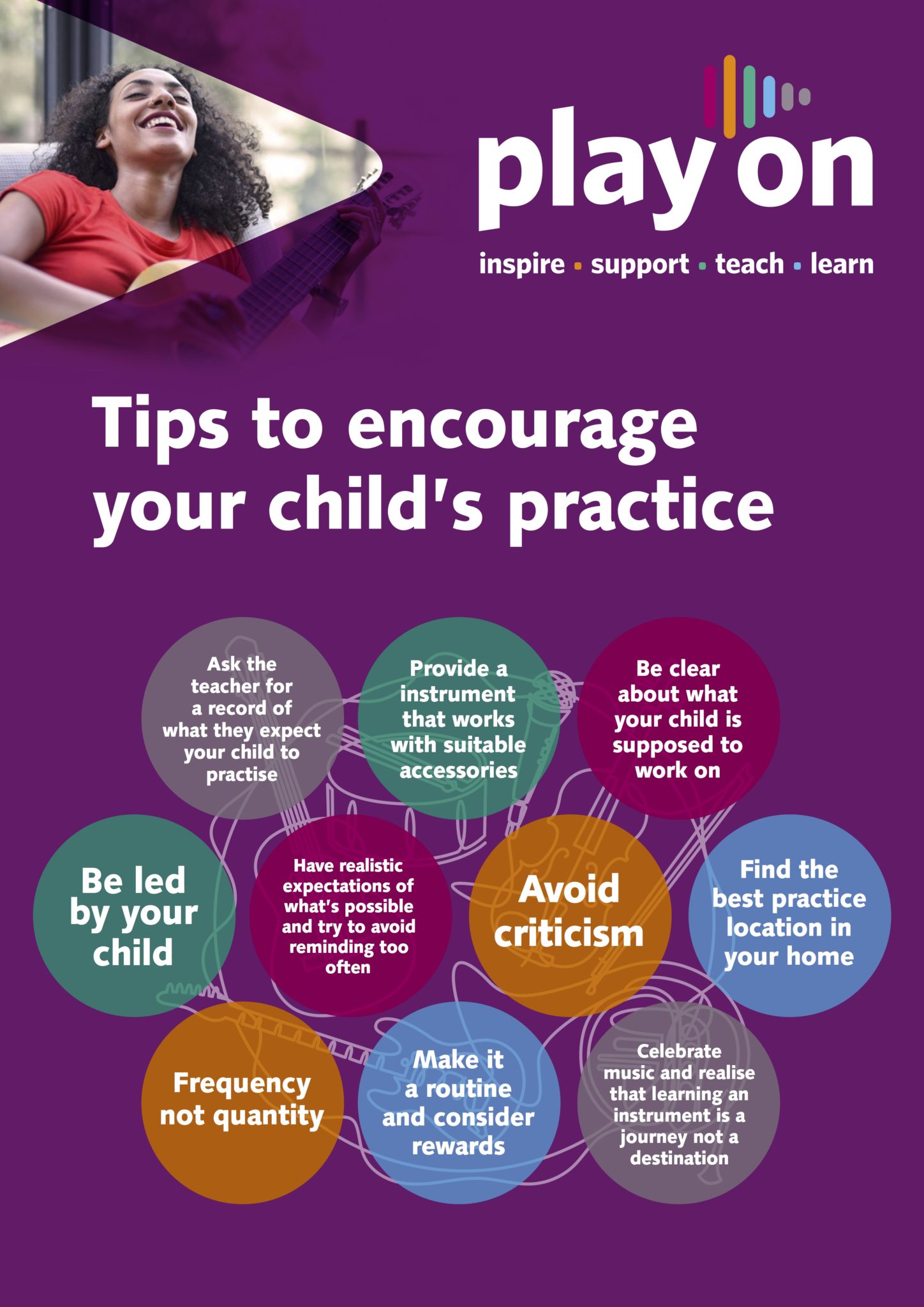How can I support my child’s practice?

When your child starts to learn an instrument it can be really exciting – for both of you. As a parent you will want to do all you can to support your child’s musical development. It’s well-known that practice between lessons is essential for a child to progress. But did you know that developing a love of music generally can go a long way towards helping practice materialise in later years? As a parent, you are an integral part of your child’s potential musical success. Remember also, that success is most likely to be achieved when you work in partnership with your child’s teacher.
The wider musical world ….
For a child to want to practise an instrument, cultivating their love of music is a very important first step. This can begin at any stage. Some classes are even available for pregnant mums and simply singing nursery rhymes at home can help, as well as developing literacy skills. Having classical music to listen to in the home or car and making time for informal music making all support the desire to make music. There are many opportunities to watch online performances of famous musicians, including performances specifically for younger children. Exposure to inspirational music of any kind can be exciting for children and pay dividends in the long term.
Mary, mother of 16-year-old Beth who wants to be an opera singer, shares this experience:
“When Beth was six she took part in a memorial service where she sang with a small group of children. As part of the event, an opera singer also performed. She was so mesmerised by his performance and spoke for weeks afterwards about his amazing sound and storytelling. I think it was this exposure that sowed the seed for her singing ambitions. She even recounts the story today.”
Here are some practical tips to encourage your child to practise:
- Ask the teacher for a record of what they expect your child to practise – Many teachers do this automatically or are willing to if asked. It can be difficult for children to remember what to do after the lesson and some kind of practice notebook means you can support your child at home. Why not try Music Case, our free digital practice app?
- Provide an instrument that works with suitable accessories – Children need an instrument that works. Without this, their practice will be a struggle! If you can, ask your child’s teacher to train you (or your child if they’re old enough) to tune their instrument. It’s very hard to practise well if the instrument itself isn’t in tune. The right stool for a piano is also important so that poor posture doesn’t make practice uncomfortable. Spare reeds for woodwind instruments (if they split you can’t play) and valve oil for brass instruments (stiff valves make playing tricky) all help to encourage practice to happen.
- Find the best practice location in your home – A cold or noisy space is not ideal. It needs to be inviting and free from distractions. If possible, keep a music stand set up and ready.
- Be clear about what your child is supposed to work on – Many teachers provide details of this (as mentioned above). If you are not clear and your child appears unsure, clarify this with your child’s teacher.
- Be child led, as learning an instrument takes time – If your child is struggling to cover everything on their practice list or finding certain things tricky, share this with their teacher. Be aware that learning an instrument is something that happens over a long time. Hard work does go a long way and natural ability can be exaggerated. Be positive, celebrate what your child has achieved and be realistic. It can take an average of three years or even longer for a child to reach Grade 1 level on some instruments. Seeing things develop slowly with gradual persistent hard work is a valuable skill for your child to acquire and can help in other areas of their life too.
- Have realistic expectations of what’s possible and try to avoid reminding too often – It can work well if the teacher provides the expectations for your child’s practice while you are simply your child’s ‘greatest fan’. If the child sets the practice frequency this can also be very empowering, but try to make this a minimum of four times a week. Every other day is a good plan.
- Avoid criticism – It can be hard to hear a child play a mistake over and over, or listen to them play too quickly and make mistakes as a result. However, if you continually criticise, your child can quickly become demotivated. The principle of ‘teacher teaching and parent praising’ is a useful one to follow here, but the praise needs to be genuine. Children know when things aren’t going so well. Simply let the teacher know (very discreetly) where the problems are and they can help your child learn the skills to practise more effectively and iron out any problems.
- Frequency not quantity – In the early stages, doing a very long one-hour practice once a week isn’t as effective as four practices of 15 minutes every other day. Regularity is incredibly important. Several ad-hoc five-minute practices in a day can be extremely worthwhile. Practice time does need to increase along with level of difficulty, although this can vary from student to student.
- Make it a routine and consider rewards – Some families find it helpful to make music practice part of the family routine – same time each day. In addition, some families have reward systems for doing practice, from stickers to earning a treat. Every family is different so work out what’s best for you.
- Celebrate music and realise that learning an instrument is a journey not a destination – Sometimes children play their instrument a great deal without doing much (or any) of the practice they’ve been asked to do by their teacher. Making any music is a good thing. Ideally, this needs to be complemented by structured material that aids progress. But at times children can struggle to comply. Parents and teachers have a careful path to tread here. Sometimes a less structured approach can be beneficial, from playing familiar music by ear from YouTube to learning music from a new film or pop song – it’s all music making to be celebrated! Try to encourage your child to make their instrument a potential lifelong friend. There’s so much value in music making for overall wellbeing, so take a long-term view and be flexible about the type of practice or playing that’s being completed. You may be surprised when your child happily returns to traditional scales, repertoire and their teacher’s suggested curriculum, even without a prompt from you.

By Karen Marshall. This article first appeared on ABRSM.






